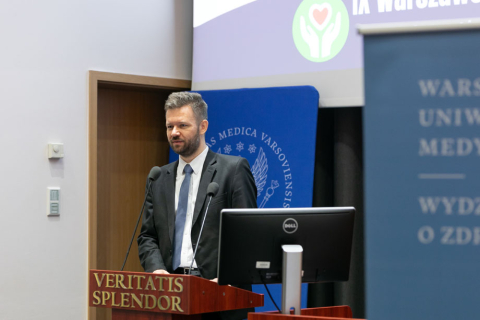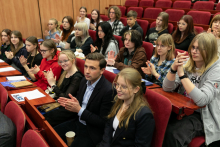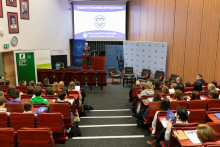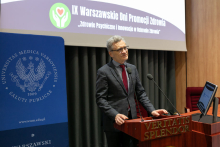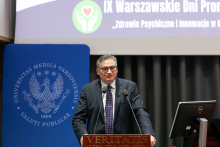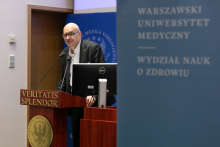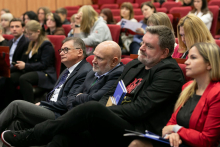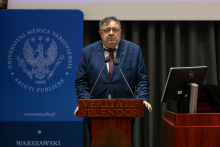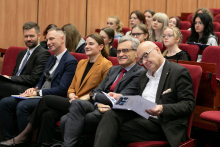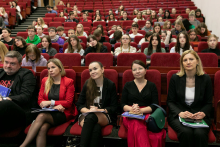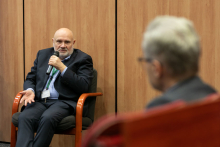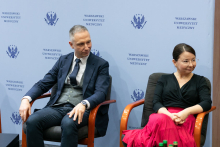Opening of the conference
The conference inaugurators – Rector of the Medical University of Warsaw prof. Zbigniew Gaciong, Chair of the Council of Health Sciences Disciplines prof. Bolesław Samoliński and Dean of the Faculty of Health Sciences prof. Mariusz Gujski – unanimously emphasized that the topics discussed during the symposium correspond to current challenges in the field of public health.
Rector prof. Zbigniew Gaciong said: - Mental health problems are not new, but now we have become more sensitive to them, especially when they affect young people. I would like to thank all the experts who will take part in the panels, and thanks and congratulations also go to the hosts.
- The history of mental disorders is as long as the history of humanity - noted prof. Mariusz Gujski. And he added: - Today the approach is changing – we no longer talk about mental illnesses but about mental disorders. As a society, we are becoming accustomed to the fact that statistically each of us can experience at least one depressive episode, and that there are many problems in our environment. I hope that today’s event will not only inspire, but also push, our community to take public health actions that are pertinent to the needs.
Challenges for young people’s mental health
They were discussed during the first panel of the congress, led by dr hab. Dominik Olejniczak from the Department of Public Health of the Medical University of Warsaw. His interlocutors were prof. Tomasz Wolańczyk, Head of the Department of Developmental Age Psychiatry at the University Clinical Center of the University, Renata Szredzińska, President of the “Empowering Children” Foundation, and Damian Marciniak, Director of the Department of Mental Health in the Office of the Patient Ombudsman.
Prof. Tomasz Wolańczyk talked about the overcrowding of psychiatric wards and the huge needs in this area. The psychiatric ward he manages has a capacity for 20 patients but over 40 persons are treated there now.
Ms. Renata Szredzińska emphasized that the topic of mental health used to be in fifth place in terms of problems reported by children who contacted the 116 111 Helpline. Now this topic appears most often in children’s statements.
Prof. Tomasz Wolańczyk admitted that the “Empowering Children” Foundation is one of the few organizations that try to fight the causes, not alleviate the symptoms.
- The most important thing we need to deal with now is prevention because it is the only way to reduce the overload of psychiatric hospitals - said prof. Wolańczyk.
Damian Marciniak pointed out that young people often do not know what help they could use, so they most often look for support from their peer group.
- We must therefore prepare them to support one another - emphasized Damian Marciniak.
Mental health as a priority for the health care system
The reform of child and adolescent psychiatry, cooperation between ministries, a new psychiatric model of developmental age, as well as the education of specialists and the use of the potential of public health graduates were also discussed during the conference.
Deputy Minister of Health prof. Urszula Demkow said: - Educating psychiatrists is a long-term process, so in the current situation, the maximum potential of health promotion and public health graduates should be used to ensure the strengthening of the mental health of young people.
The Deputy Minister also noted that the topic of mental health is one of the priorities of the current government.
"The ‘National Mental Health Protection Program for 2023-2030’ is currently being implemented in Poland and one of its operational goals involves the prevention of mental health disorders. The ‘National Program for the Prevention of Suicidal Behaviors’ is also being implemented for the first time as part of the former program. It is clear that the topic has already been noticed in Polish health policy,” said dr Daria Biechowska, Director of the Department of Public Health at the Psychiatry and Neurology Institute.
Additionally, the reform of Polish psychiatry has been ongoing for several years.
As emphasized by the national consultant in the field of child and adolescent psychiatry, dr Aleksandra Lewandowska: - You can reform something that exists but community care for the developmental age did not exist in our country. There was no coordination and no comprehensive approach. We build this model composed of three reference levels from scratch.
Asked by dr hab. Dominik Olejniczak about the interdisciplinary nature of activities, Deputy Minister of National Education Paulina Piechna-Więckiewicz emphasized: - We are meeting the day after a breakthrough event: the tripartite declaration of inter-ministerial cooperation for the mental health of young people. From now on, the Ministry of National Education, the Ministry of Health and the Ministry of Family, Labor and Social Policy have a common goal, and this approach is a breakthrough that was expected from the government. First of all, we notice that it will be necessary to develop a scheme of conduct for students returning to school after being released due to mental health problems in order to minimize the risk of exclusion of these persons from their peer groups.
Better quality of health care thanks to new technologies
One of the panels was devoted to the use of new technologies in health care. The panelists talk about the opportunities and threats arising from the use of artificial intelligence, the limits of replacing human work and the liability of artificial intelligence. As Justyna Mieszalska, President of the Medical Center of the Medical University of Warsaw, pointed out, over 6% of Polish hospitals and 35% of Polish start-ups use artificial intelligence, and investments in AI in Polish medical facilities have recently increased from 35 to 46%.
“Modern diagnostic solutions have made it possible to significantly shorten the time of performing tests, such as magnetic resonance imaging or computed tomography, from 25 to a maximum of 10 minutes, additionally significantly reducing the level of radiation,” said Piotr Kuskowski, Director for marketing and strategy at Siemens Healthineers Sp. z o.o.
Conclusions from the 9th “Warsaw Health Promotion Days”
- The conclusions drawn from this year’s edition of the ‘Warsaw Health Promotion Days’ are that activities aimed at improving and strengthening the mental health of children and adolescents have become significantly more dynamic, and that the need for interdisciplinary approach has been noticed - said dr hab. Wojciech Olejniczak. And he added: - It is significant that the role of public health was repeatedly emphasized during the conference, especially in the context of coordinating preventive and corrective actions.
